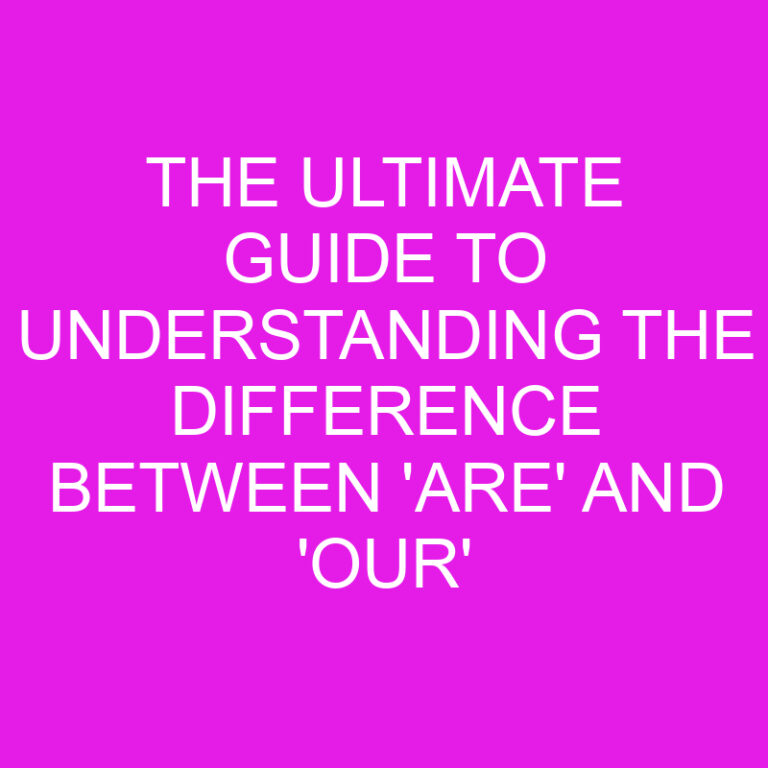
Have you ever wondered about the difference between “payed” and “paid”? These two words may sound similar, but they actually have distinct meanings and uses. As an expert in language and grammar, I’m here to shed some light on this common confusion.
Firstly, let’s talk about “payed.” This is a word that is often mistakenly used instead of “paid.” However, “payed” is actually a nautical term that refers to the process of sealing the seams of a ship with pitch or tar. So, unless you’re a sailor or shipbuilder, you’ll rarely encounter the word “payed” in everyday language.
Post Contents
Key Takeaways
- “Payed” is a nautical term used to describe sealing the seams of a ship with a waterproof substance like pitch or tar.
- “Paid” is the correct past tense and past participle of the verb “pay” and is used when referring to transferring money to someone in exchange for goods, services, or as compensation.
- The usage of “payed” is limited to nautical contexts and should not be used outside of it.
- Using “payed” instead of “paid” in everyday language can lead to confusion and misunderstandings.
- “Paid” is the appropriate word to use when discussing monetary transactions in everyday language, while “payed” is only used when discussing nautical matters.
- Clarity and accuracy are important for effective communication, so it is crucial to use the correct word in the respective context.
Payed vs Paid: Understanding the Difference
When it comes to the words “payed” and “paid,” many people often confuse them or use them interchangeably. However, there is actually a clear distinction between the two. Allow me to shed some light on this common confusion.
Payed: Let’s start with “payed.” While it may sound like the past tense of “pay,” it actually has a different meaning altogether. “Payed” is a nautical term used to describe the process of sealing the seams of a ship with a waterproof substance, such as pitch or tar. This practice helps to prevent water from seeping into the vessel, ensuring its integrity and seaworthiness.
Paid: On the other hand, “paid” is the correct past tense and past participle of the verb “pay.” It is the most commonly used form in everyday language. We use “paid” when referring to transferring money to someone in exchange for goods, services, or as a form of compensation. For example, “I paid for my dinner last night” or “She gets paid for her work every week.”
It’s important to note that “paid” is the accepted form and should be used in all other contexts outside of nautical terms. Using “payed” instead of “paid” can lead to confusion and misunderstandings in writing and conversation.
Understanding the distinction between “payed” and “paid” helps avoid miscommunication and ensures proper usage of these words. So, remember to use “payed” when referring to sealing the seams of a ship, and use “paid” for any other payment-related context.
Now that we have clarified the difference between these two words, let’s dive deeper into some common misconceptions and examples to reinforce our understanding.
The Meaning and Usage of “Payed”
As a seasoned writer, I often come across words that are commonly mistaken for each other, and one such pair is “payed” and “paid.” While “paid” is a familiar word in everyday language, “payed” is less frequently used and is more specific to nautical contexts. In this section, I will delve into the meaning and usage of “payed” to provide you with a clear understanding of its proper application.
In nautical terms, “payed” refers to the sealing of the seams of a ship using a mixture of substances like pitch or tar. This process prevents water from entering the vessel and compromising its integrity. It is important to note that the usage of “payed” is limited to this specific maritime context.
Outside of the nautical realm, “payed” is not used to indicate the transfer of money in exchange for goods or services. Instead, “paid” is the correct word to use. Whether you are giving money to someone for a service rendered or buying something at a store, “paid” should be your go-to word.
Using the correct term is crucial to avoid confusion and ensure effective communication. By understanding the distinction between “payed” and “paid,” you can confidently use the right word in the right context. Now that we have clarified the meaning and usage of “payed,” let’s move on to exploring the correct usage of “paid” in everyday language.
The Nautical Background of “Payed”
In the world of nautical terminology, the word “payed” takes on a different meaning than its everyday usage. It refers to the process of sealing the seams of a ship. When wooden ships were the primary vessels used for maritime travel, it was crucial to prevent water from seeping into the hull. Sealing these seams required a special technique known as “paying.”
During the process of paying, a substance called “pay” would be applied to the seams to make them watertight. This substance, often a mixture of hot pitch or tar, would be spread along the seams and then heated so that it would penetrate into the wood, effectively sealing any gaps. This meticulous process was essential to keep the ship afloat and ensure the safety of everyone on board.
It is important to note that the term “payed” is specific to the nautical context and does not have any relevance outside of it. In everyday language, the correct word to use when referring to the transfer of money in exchange for goods or services is “paid.” Misusing these terms can lead to confusion and misunderstandings.
Understanding the nautical background of “payed” helps us grasp its limited scope and usage. While it is an interesting aspect of maritime history, it is essential to use the word “paid” for any other context involving the exchange of money. By adhering to this distinction, we can communicate clearly and avoid any potential misinterpretations.
- “Payed” is a term used in nautical terminology for sealing the seams of a ship.
- The process of “paying” involves applying a substance to the seams and heating it to make the ship watertight.
- This term is limited to the nautical context and should not be used outside of it.
- In everyday language, the correct word to use for the transfer of money is “paid”.
Common Mistakes: When to Use “Payed” and When to Use “Paid”
Let’s clear up the confusion once and for all. It’s a common mistake to use “payed” instead of “paid” in everyday language. Many people are unaware that “payed” is actually a nautical term with a very specific meaning.
When it comes to transferring money in exchange for goods or services in everyday contexts, “paid” is the correct word to use. For example, if you’ve settled a debt, compensated someone for their work, or bought something, you would say “I paid the bill,” “I have paid my employees,” or “I paid for the shoes.”
On the other hand, “payed” is used exclusively in nautical contexts. It refers to the process of sealing the seams of a wooden ship using a mixture of tar and oakum. This was done to make the ship watertight and prevent leaks. For instance, a sailor might say “We payed the hull of the ship to ensure its integrity during our voyage.”
It’s important to note that “payed” should not be used outside of the nautical context. Using “payed” instead of “paid” in everyday language can make you sound unfamiliar with standard usage.
To summarize:
- “Paid” is the correct word to use in everyday language for transactions involving money.
- “Payed” is a nautical term used to describe sealing the seams of a ship.
- Using “payed” outside of the nautical context is incorrect and can lead to confusion.
Remember, clarity and accuracy are key when it comes to effective communication.
Examples of Correct Usage
In everyday language, “paid” is the correct word to use when referring to the transfer of money in exchange for goods or services. Here are some examples of correct usage of the word “paid”:
- “I paid for my dinner at the restaurant last night.”
- “She paid her rent on time.”
- “They paid the contractor for the renovations to their house.”
In these examples, “paid” is used to indicate that a monetary transaction occurred. It is the appropriate word to use when talking about financial transactions in any context outside of the nautical field.
It’s important to note that using “payed” in these examples instead of “paid” would be incorrect and could lead to confusion. Using the wrong term can cause misinterpretation and undermine clarity in communication.
Additionally, the word “payed” has a very specific nautical meaning. It is used to describe the process of sealing the seams of a ship to make it watertight. This term is not used in everyday language and should only be used when discussing nautical matters.
To summarize, “paid” is the appropriate word to use when discussing monetary transactions in everyday language. It is the correct term to use when referring to the transfer of money in exchange for goods or services. On the other hand, “payed” is a nautical term that describes sealing the seams of a ship. Using “payed” in any other context can lead to confusion and should be avoided.
Conclusion
It is important to understand the difference between “payed” and “paid” to avoid confusion in everyday language. While “payed” is a nautical term used to seal the seams of a ship, “paid” is the correct word to use when referring to transferring money in exchange for goods or services.
Using “paid” in everyday language when discussing financial transactions is not only grammatically correct but also ensures clear communication. Incorrectly using “payed” instead of “paid” can lead to misunderstandings and confusion.
Remember, “payed” should only be used in the context of nautical matters, while “paid” is the appropriate word to use for any monetary transactions outside of the nautical field.
By understanding and using the correct word, “paid,” you can effectively communicate your financial transactions and avoid any potential confusion or misinterpretation. So, next time you’re discussing payments, remember to use “paid” and leave “payed” for the nautical realm.
Frequently Asked Questions
Q: What is the difference between “payed” and “paid”?
“A: The word ‘payed’ is a nautical term used for sealing seams of a ship. On the other hand, ‘paid’ is the correct term to use when talking about transferring money in exchange for goods or services in everyday language.”
Q: When should I use “paid”?
“A: You should use ‘paid’ when referring to any monetary transaction in everyday language. For example, ‘I paid for my groceries at the supermarket.'”
Q: Can I use “payed” instead of “paid” in everyday language?
“A: No, using ‘payed’ instead of ‘paid’ in everyday language would be incorrect and can cause confusion. Stick to using ‘paid’ when talking about financial transactions outside of the nautical field.”
Q: When is it appropriate to use “payed”?
“A: ‘Payed’ should only be used when discussing nautical matters, specifically in reference to sealing the seams of a ship.”
Q: What should I remember about these words?
“A: Remember that ‘paid’ is the appropriate word to use for monetary transactions in everyday language. ‘Payed’ is a nautical term that only applies to sealing ship seams, and using it anywhere else can lead to confusion and should be avoided.”






